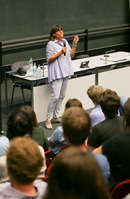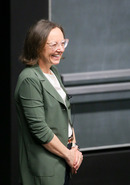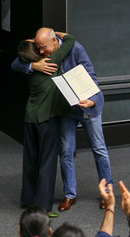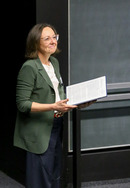Prof. Dr. h.c. Paola Arlotta
GSN Honorary Doctorate for Prof. Paola Arlotta, awarded on April 30th, 2024
Seven years after awarding its first honorary Ph.D. title, the Graduate School of Systemic Neurosciences (GSN-LMU) conferred the Doctorate Degree "Doctor of Philosophy honoris causa" to Prof. Dr. Paola Arlotta on April 30th, 2024, for "her groundbreaking work on the development of brain organoids from human stem cells". To cite further from the degree certificate, her countless breakthrough discoveries "now enable neurobiological work for a deeper understanding of the normal cerebral cortex development in mammals, as well as its abnormal developments, which underlie many neurodegenerative and psychiatric diseases."
After a Laudatio by GSN Faculty Member Prof. Dr. Magdalena Götz, the certificate was handed over by GSN Founder Prof. Dr. Benedikt Grothe during the 2024 Munich Brain Day meeting, organized by several institutions part of the Munich Center for Neurosciences (MCN-LMU).
In her keynote lecture titled Organoids as Avatars to Study Human Brain Development and Disease, Paola Arlotta offered the 400-people audience in the large lecture hall of the Max-Planck Institute for Biological Intelligence a captivating insight into the work carried out in her laboratory at the Department of Stem Cell and Regenerative Biology of Harvard University.
Below a few excerpts from the Laudatio:
Dr. Arlotta had been trained in biochemistry and molecular biology at the Universities of Trieste in Italy and Portsmouth, UK. After obtaining her Ph.D. she entered the field of developmental neurobiology as a postdoctoral fellow at Harvard Medical School. In 2007 she became the Morris Kahn Associate Professor of Stem Cell and Regenerative Biology as well as a Faculty at the Harvard Stem Cell Institute. Today, Paola Arlotta holds an Endowed Chair, the Golub Family Professor of Stem Cell and Regenerative Biology, and is Chair of the Harvard University Department of Stem Cell and Regenerative Biology at the Harvard Stem Cell Center (HSC). She has an outstanding track record of publishing in the best journals in the field and has received numerous prizes, the Friedrich Wilhelm Bessel Research Award from the Alexander von Humboldt Foundation being only one of them.
Paola Arlotta is best known for her work using 3D cerebral organoids derived from human induced pluripotent stem cells (iPSCs). Throughout her career, she made several major discoveries and challenged several dogmas in the field of cortex development. Her first major breakthrough was the identification of fate determinants for neuronal subtype diversity in the murine cortex, at a time when nobody had managed to isolate individual neuronal subtypes.
A major dogma challenged by Paola Arlotta's early work was the assumption that the identity of central neurons is immutable. Paola Arlotta's finding disrupted this belief, showing that postmitotic neurons, albeit only at an early stage, can reprogram their identity from one class to another within the living organism and contributed to the start of a new field, that of neuron-to-neuron reprogramming in the intact nervous system.
A further true paradigm shift constituted her research indicating that distinct neurons “use” myelin differently to implement individual strategies for long-distance communication, which forced the field to reconsider the role of myelin in different brain circuits.
More recently, by combining increasing organoid complexity and maturity with unprecedented organoid-to-organoid reproducibility, mimicking developmental milestones previously observed only in the embryo, her group at Harvard was the first to demonstrate that human brain organoids can undergo a very controlled process of development to produce, with single-cell specificity, all of the major cell types of a given brain region, through tightly governed steps of development that are effectively indistinguishable from those of the naturally developing brain.
Dr. Arlotta's use of organoids allowed her to discover novel mechanisms of disease. She was the first to find that multiple genetic states linked to Autism converge on the same target cell types and developmental process (both unknown before this work was published in Nature), and in a genetic background-dependent manner.
Recently, her group managed to generate single human organoids that contain cells derived from several donors. Using these new models, which she termed “Chimeroids”, she has been able to show that differential responses to neurotoxic triggers and drugs can be discovered with single-cell resolution, across many individuals.
Beyond being an outstanding scientist, Paola Arlotta is also well known for her leadership and mentorship. Together with her group, she has been repeatedly involved in the Harvard-LMU Young Scientists' Forum, which has been a tradition since 2009, significantly helping to tighten links between the neurosciences at Harvard University and LMU Munich.






